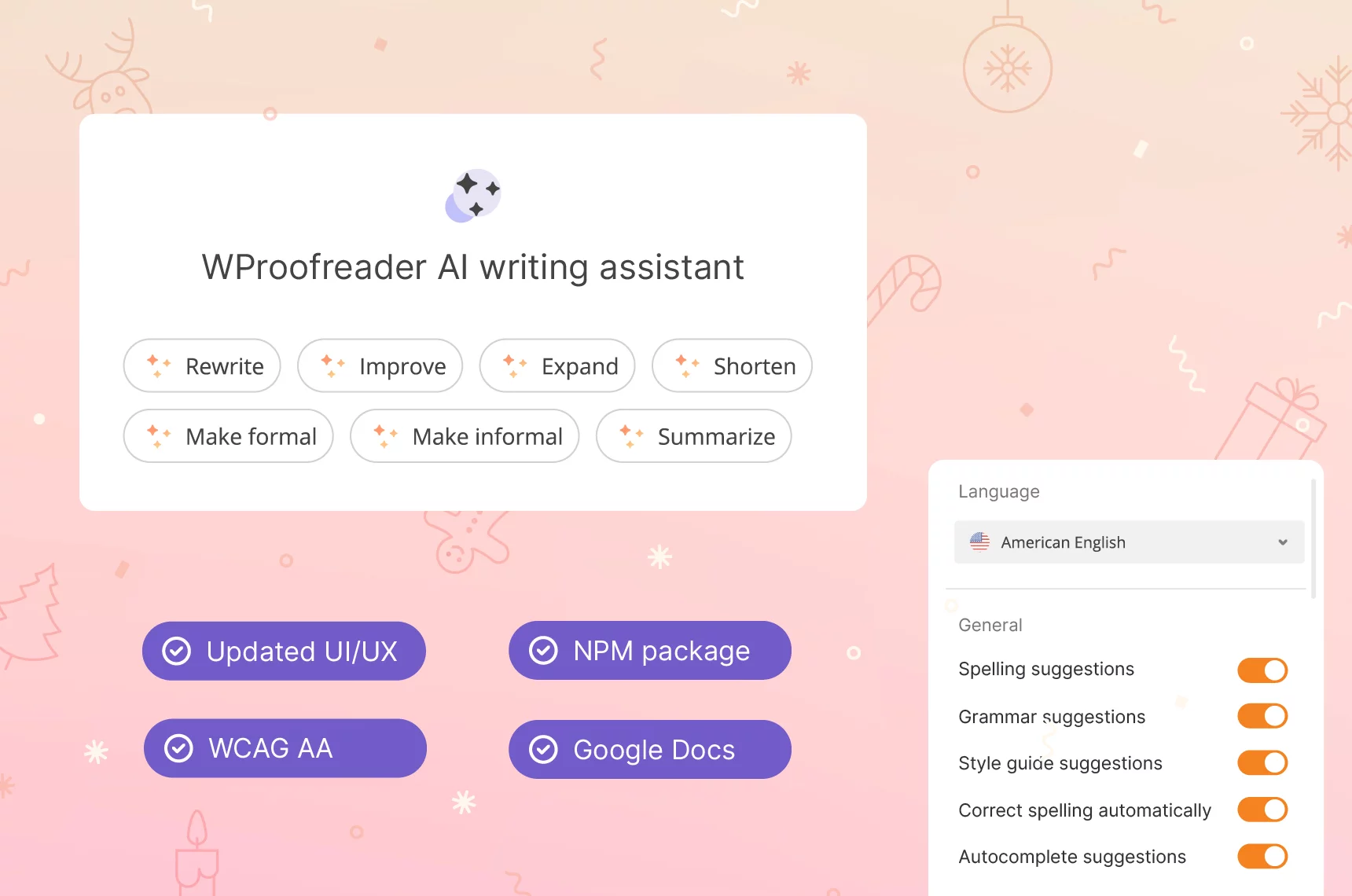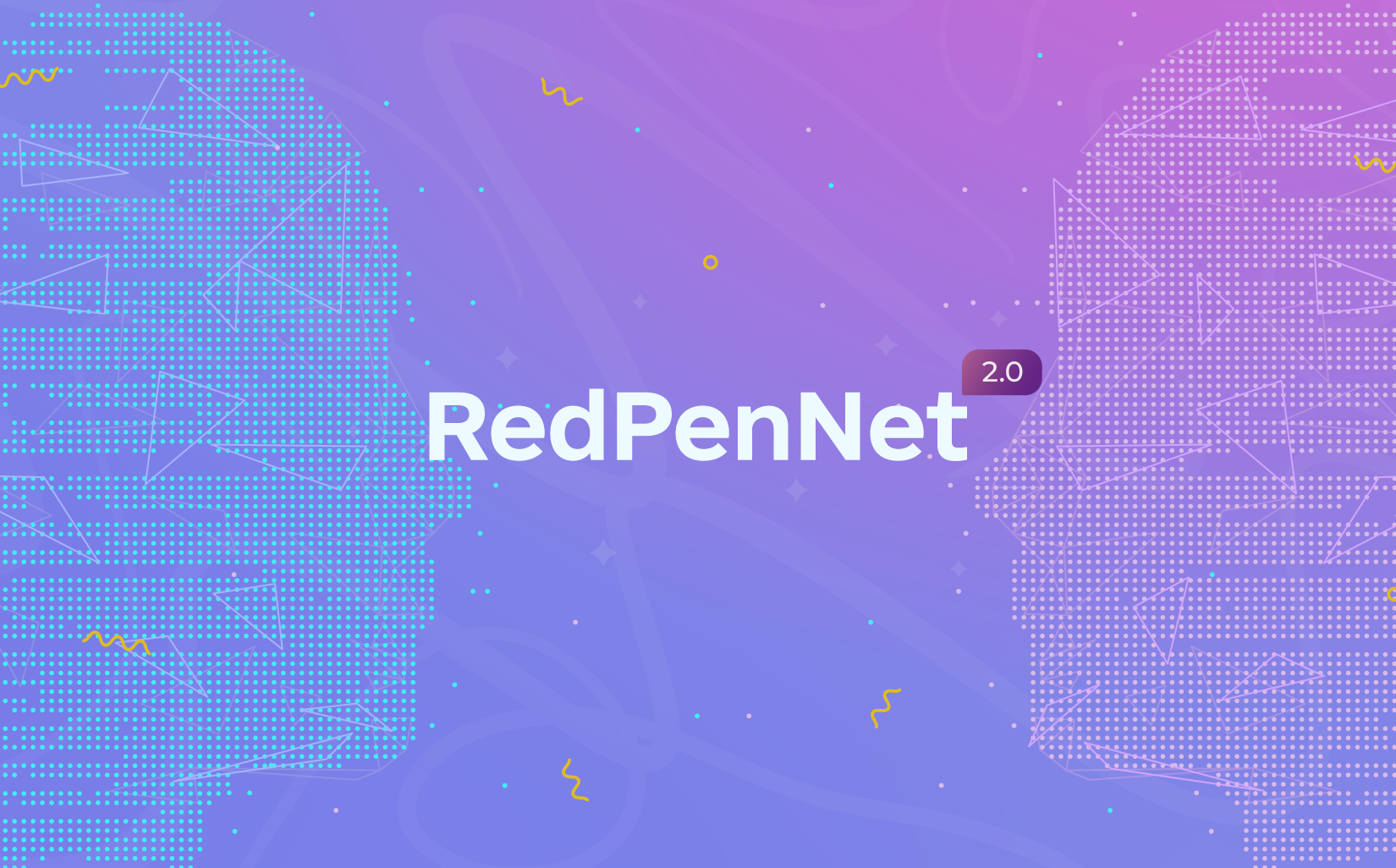Greetings. We continue writing about text checkers and their benefits for clients and end users. This time the focus is on a very-very cool feature (yet frequently abandoned) — custom spelling dictionaries.
For no reason, these bells and whistles are left behind. However, they have enormous potential. Tell us, when was the last time you wrote PERLLA, esquisse-esquisse or bhnd and got that pesky underline? Ours was just now. Google native spell-check doesn’t know what bhnd stands for 😒
Not all text checkers are savvy in professional jargon, so users usually need to build their custom wordlists to avoid red lines.
Keep reading to learn what a custom dictionary is, why users and businesses need them, and how devs can easily integrate them into digital solutions.
WProofreader SDK for developers
Available as a cloud or on-premise solution. Get free trial.
Explore moreCustom spelling dictionaries, pro jargon, and style guides
One can take professional slang differently. You may love or hate it but cannot admit its inevitability. Business jargon is words and phrases used by business employees to convey unique ideas and directions.
Architects would ask each other for esquisses, rough sketches for a design. Eye doctors or nurses would write PERLLA in examination reports. Police officers would type bhnd instead of behind in the corporate chat.
Jargon flourishes and thrives in workplaces because it fulfills a number of fundamental needs: efficient and accurate communication, feeling or signaling people’s membership in a professional community, group trust and efficiency, fewer unproductive discussions, etc.
Despite the benefits of business lingo, it may lead to misunderstanding in external communication. That awkward feeling when you receive a client email with an unknown abbreviation😩 — Should I clarify it or leave it as is? Or unintentional baffling of newbies and even unpredictable costs due to misspellings in public content.
Big companies establish the rules and standards of corporate speak in onboarding handbooks, corporate style guides, and wordlists. Famous brands crafting daily unique product names with distinctive spelling to stand out is a great example. We at WebSpellChecker stick to the camel case spelling of our brand name and are very, very, very upset when someone calls us web spell checker or Webspell checker 😭
But would you turn to the guide to check every catchword you and your peers are used to? Chances are NO more than YES.

We’ve talked here a lot about the potential of text checkers to enhance business communication. Those magic features like spelling autocorrect, language autodetect, and autocomplete suggestion, aka text prediction or Smart Compose, can do.
But custom spelling dictionaries may serve you even better! Imagine you build or delegate someone to create an extensive list of buzzwords your team relies on daily.
No obtrusive underlines, chatting and documenting flow is smoother than ever 😎
By default, this functionality is called a custom spelling dictionary, and there may be two types: user and company-wide (team or shared) wordlists, etc.
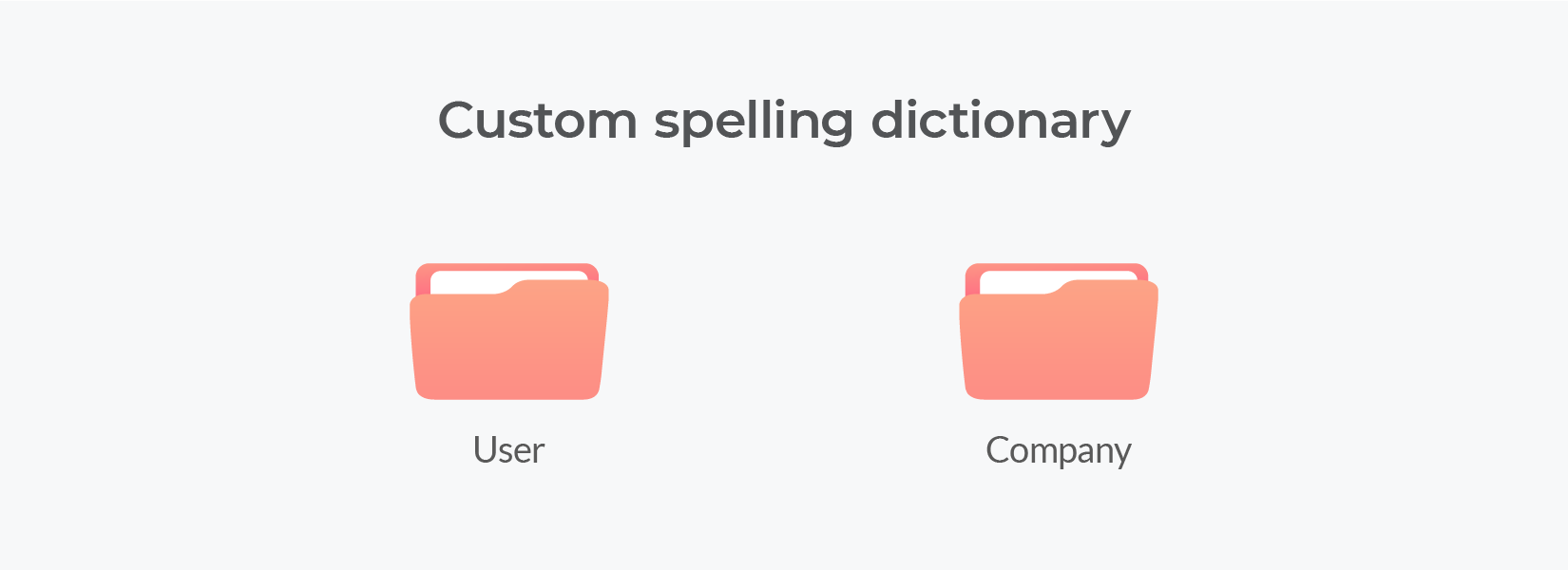
Individual users can build the former; the latter is designed for admins who have the rights to create shared dictionaries for teams, departments, and companies.
For developers, there’s an option to automatically upload wordlists via a custom dictionary API. A brief feature overview goes further — stay tuned.
Let’s check how custom dictionaries work on a text with a unique product name: “Jerry, how do you like our new product name? AccuratEdit.”
WProofreader — a spelling and grammar checker with a custom dictionary API feature
WProofreader is a multilingual spelling and grammar checker with an option to create company-level and user-level dictionaries via API (HTTP or web API).
Beyond that, we have realized a new brand feature of WProofreader: AI writing assistant 🪄 This tool helps you rephrase text and create content effortlessly. It will make your text more formal or informal, summarize lengthy sections, and proofread for mistakes. Our generative AI supports English, German, Spanish, Portuguese, French, Dutch and Swedish. Currently, only users of the cloud version can access this feature.
A user custom dictionary is a functionality for the end users allowing them to create dictionaries with custom words such as complex words, acronyms, and proper names or other words that are not recognized by WProofreader. All the words added to a personal dictionary will not be considered as misspellings and will also be available in the suggestions list. Although, it’s not available for the languages based on the AI-driven engine.
Users can build, edit and delete custom wordlists from the product UI and dashboard.
The global custom dictionary is a special mechanism that allows the creation of company-wide dictionaries intended to extend the vocabulary of the standard dictionary with custom words specific to your industry, domain, etc. All the words added to a custom dictionary will be available for all web application users within a company or a certain group of users.
In 2022, WebSpellChecker launched a custom dictionary API option for custom company-wide dictionaries. Earlier, it was available only for user-level dictionaries. Dictionary API implies that admins can make bulk operations with dictionaries: add/delete words, create new dictionaries, etc. Custom dictionary API is available as a part of WProofreader SDK.
P.S. We’ve just rolled out a style guide feature with custom rules to check non-inclusive and profanity language. Custom rules and custom dictionaries can greatly help to craft corporate style guides.
Sapling AI
Sapling AI, an AI-driven writing assistant, offers two types of wordlists: custom (Sapling AI sometimes calls this feature simply “dictionary”) and team dictionaries.
With custom dictionaries, users can add terms such as industry-specific jargon or product names to their wordlists so that Sapling AI will ignore them. Custom dictionaries are managed from the dashboard.
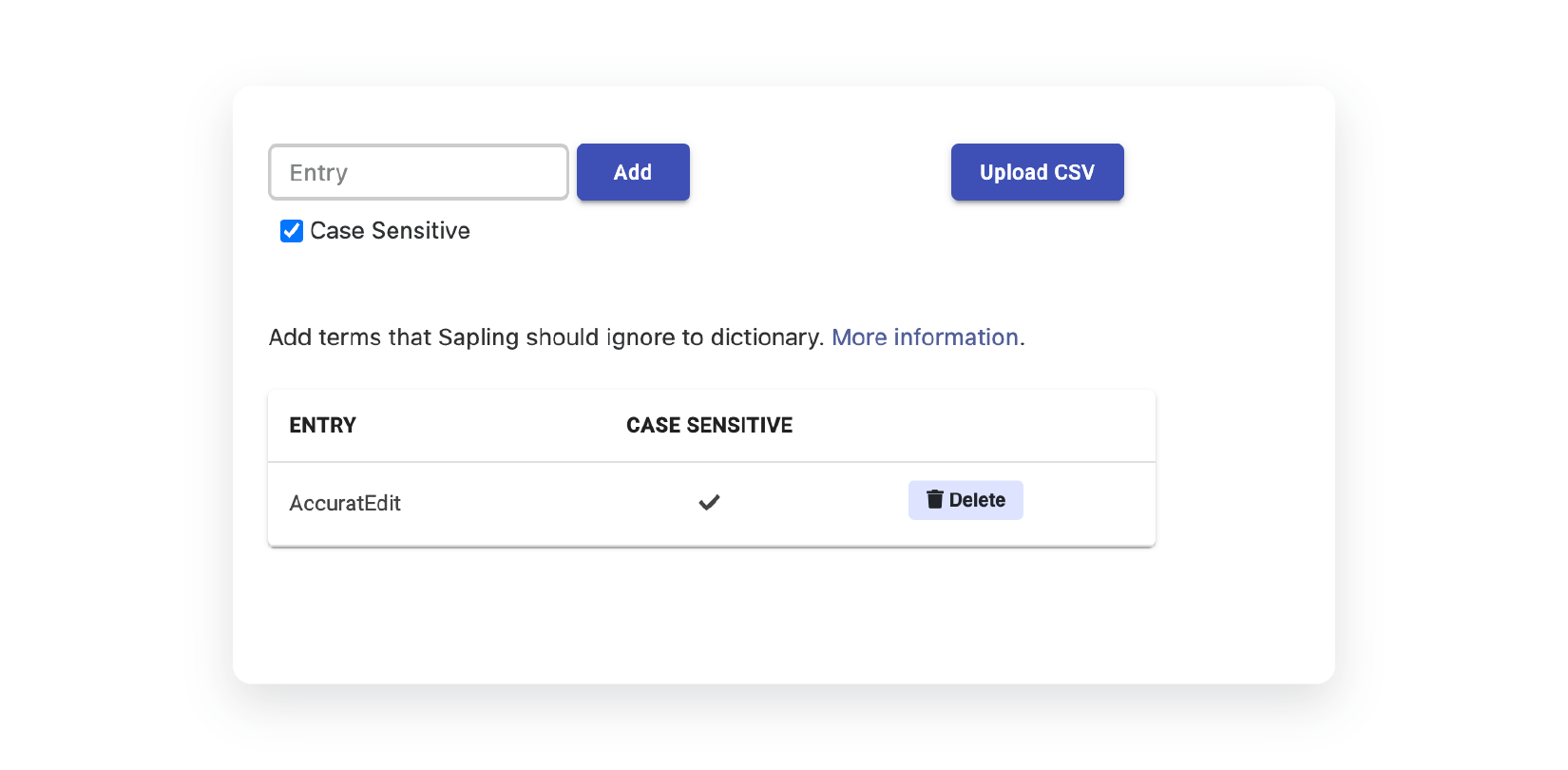
Sapling AI doesn’t offer the added-to-the-dictionary term among the suggestions.
Users with Teams can also add words to a Team Dictionary. Sapling AI typically identifies proper nouns and non-dictionary words in context but can mistake jargon that it has not seen enough to incorporate into its language model.
Predefined dictionaries can be imported into Sapling as CSV files. Team dictionary API is also available.
Grammarly
Grammarly, the best-known writing assistant, has a personal dictionary feature; users can ensure that unique words in their lexicon won’t be flagged as misspellings.
The option “Add to Dictionary.” is accessible from the UI. Also, users can access their personal dictionaries from the dashboard. Here they can see all the words they’ve added to their Personal Dictionary.
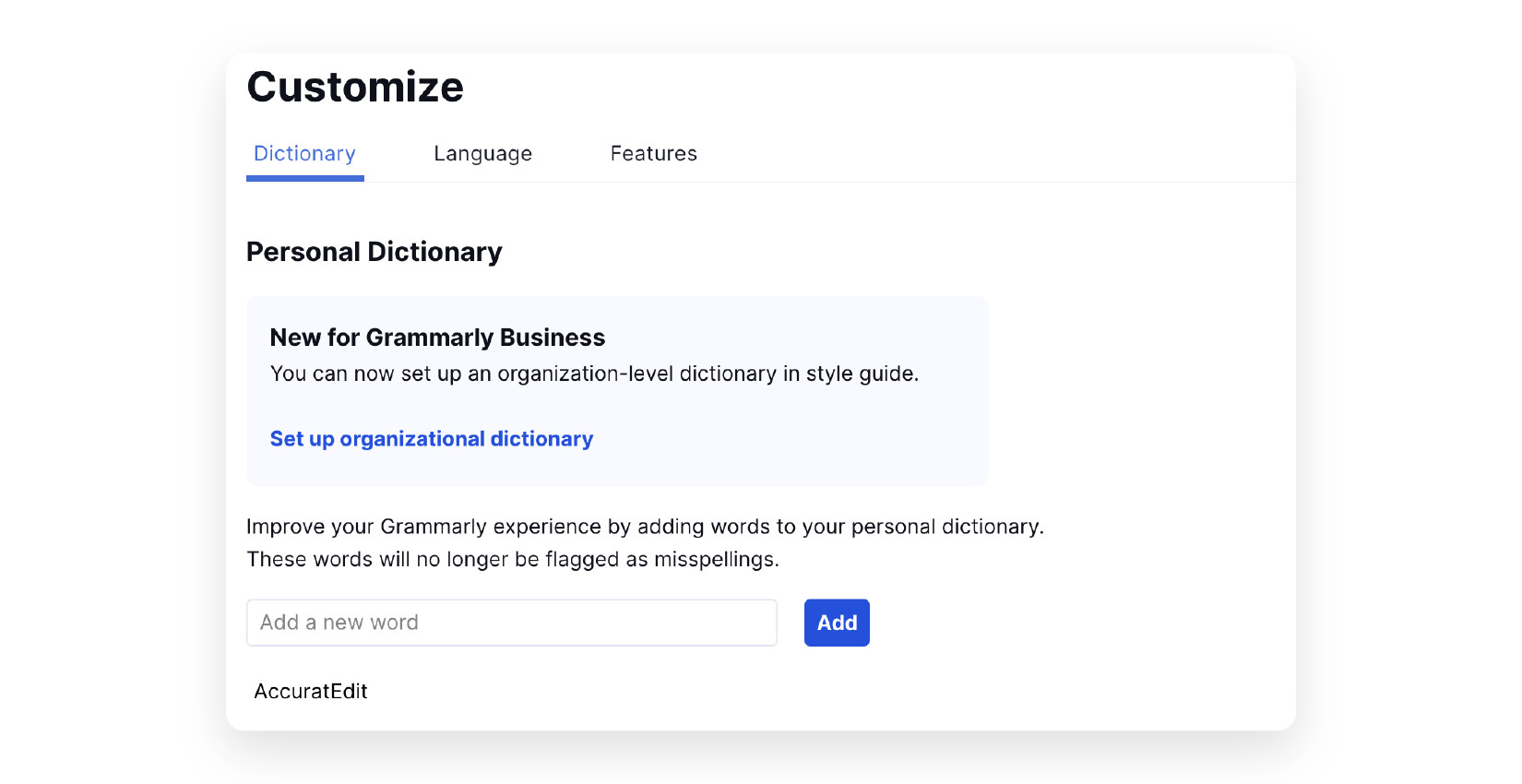
Importantly, Grammarly doesn’t offer added words to dictionaries as suggestions for misspellings. While we were writing this article, Grammarly added organization-level dictionaries to their style guides. As for now, we’ve found no info about Grammarly’s custom dictionary API. If you doubt this information, please contact Grammarly support.
LanguageTool
Language Tool Personal Dictionary allows users to add custom words and phrases to their dictionaries so they don’t get marked as incorrect or misspelled. Adding a dictionary option is available from the LanguageTool UI or in the dashboard; words added are offered as suggestions for misspellings.
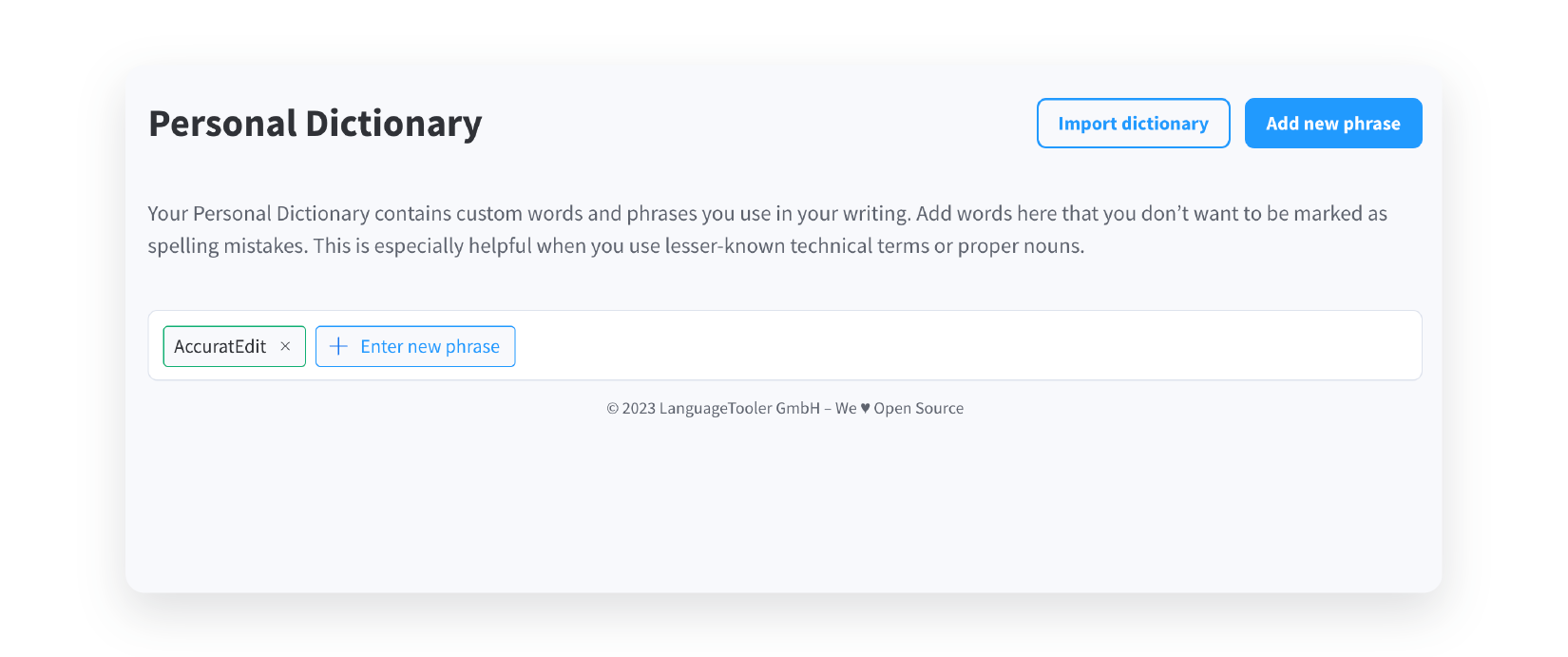
After adding AccuratEdit to the dictionary, the corrected option is available as a suggestion.
LanguageTool users can add confidence to their team’s writing, as uncommon names and terms are no longer marked as errors. LanguageTool’s Team Dictionary feature lets you add industry-specific words so your team can avoid costly mistakes and remain consistent.
ProWritingAid
Like the rest of the text checker, the user dictionary option is available from ProWritingAid, a web-based writing assistant UI. In the dashboard, an “Edit my Dictionary” option allows users to add and remove words from the dictionary.
We’ve tried the option and added AccuratEdit to the dictionary. Surprisingly, ProWritingAid keeps underlining this word as a misspelling. Also, If you make a mistake in the word and write AcuratEdit, the checker won’t offer the right word in the suggestions list.
We couldn’t find any information about team dictionaries or dictionary API on the ProWritingAid website. However, ProWritingAid promotes “Term base items” feature under their plans.
It can upload a user term base to allow preferred and highlight deprecated terms. For the holders of Enterprise plans, the base is unlimited. For more details, please contact ProWritingAid.
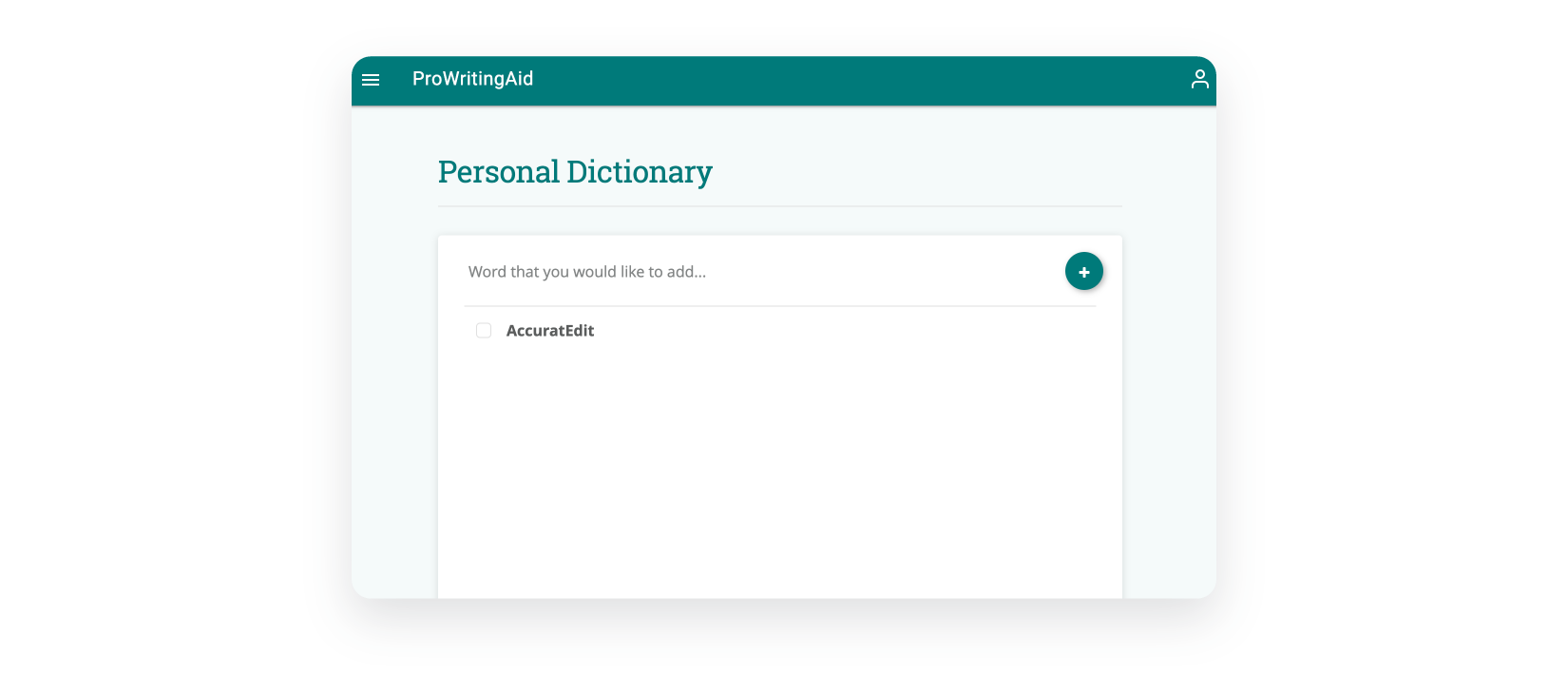

Wrapping up
Get a new karma point if you’ve read this piece about custom dictionaries up to the end 😁
So, if you’ve just landed here, grab a few insights:
- Digital custom dictionaries are super helpful regarding professional lingo, style guides, and corporate culture.
- Almost all text checkers have custom user and team dictionaries available from the UI and user dashboards.
- User dictionaries are for individual wordlists, and team dictionaries — are for company-wide shared lists.
- Custom dictionary API is a rare feature offered by some industry players, particularly WProofreader.
To learn more about WProofreader benefits for businesses and companies, contact our sales team.

